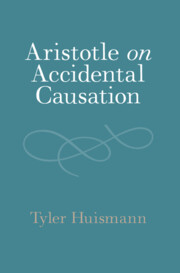Book contents
- Aristotle on Accidental Causation
- Aristotle on Accidental Causation
- Copyright page
- Dedication
- Contents
- Figures
- Acknowledgments
- Introduction
- Chapter 1 The Texture of Aristotle’s Ontology
- Chapter 2 What Is Accidental to What
- Chapter 3 Aristotle on How Efficient Causation Works
- Chapter 4 The Nature of Accidental Causation
- Chapter 5 Causal Inference
- Chapter 6 The Causal Profile of Lucky Occurrences
- Chapter 7 Why Aristotle Needs Accidental Causation
- Chapter 8 Expert Activity and the Metaphysics of Action
- Chapter 9 The Role of the Accidental in the Physical World
- Bibliography
- Index
Chapter 5 - Causal Inference
Aristotle on ‘Qua’
Published online by Cambridge University Press: 28 January 2025
- Aristotle on Accidental Causation
- Aristotle on Accidental Causation
- Copyright page
- Dedication
- Contents
- Figures
- Acknowledgments
- Introduction
- Chapter 1 The Texture of Aristotle’s Ontology
- Chapter 2 What Is Accidental to What
- Chapter 3 Aristotle on How Efficient Causation Works
- Chapter 4 The Nature of Accidental Causation
- Chapter 5 Causal Inference
- Chapter 6 The Causal Profile of Lucky Occurrences
- Chapter 7 Why Aristotle Needs Accidental Causation
- Chapter 8 Expert Activity and the Metaphysics of Action
- Chapter 9 The Role of the Accidental in the Physical World
- Bibliography
- Index
Summary
I show that a consequence of Lear’s canonical analysis of ’qua’ is that the doctor’s causing a house qua housebuilder entails that the doctor is a cause of a house, but this fact is incompatible with Aristotle’s own thought. I proceed in two stages. First, I give Lear’s analysis and show that it has the consequence I say it has by applying the analysis to a passage from Physics 1.8. Second, I consider what follows from this passage on the basis of Aristotle’s account of causing as such and its connection to causing simply. I argue that, on Aristotle’s considered view, failing to cause simply is simply failing to cause. And it is because of this that he denies precisely what Lear attributes to him. The resulting picture shows that, in all likelihood, there is no analysis of Aristotle’s use of ‘qua’. This is so because the relation between F and G, when something is F qua G, is not one that can be captured in the language of necessary and sufficient conditions with modals. For Aristotle, being F qua G does not entail, as Lear would have it, that Gs are necessarily Fs; rather, it entails that Gs are naturally Fs.
- Type
- Chapter
- Information
- Aristotle on Accidental Causation , pp. 124 - 146Publisher: Cambridge University PressPrint publication year: 2024

